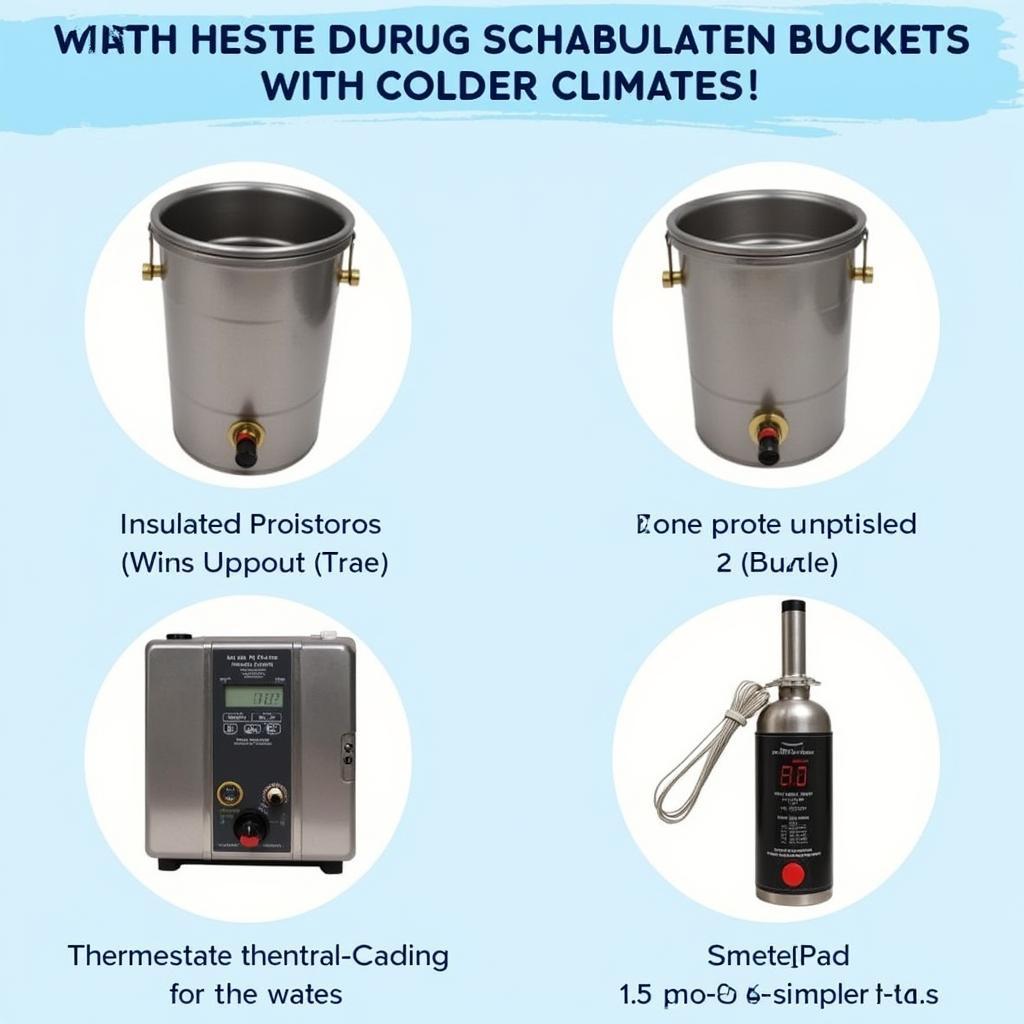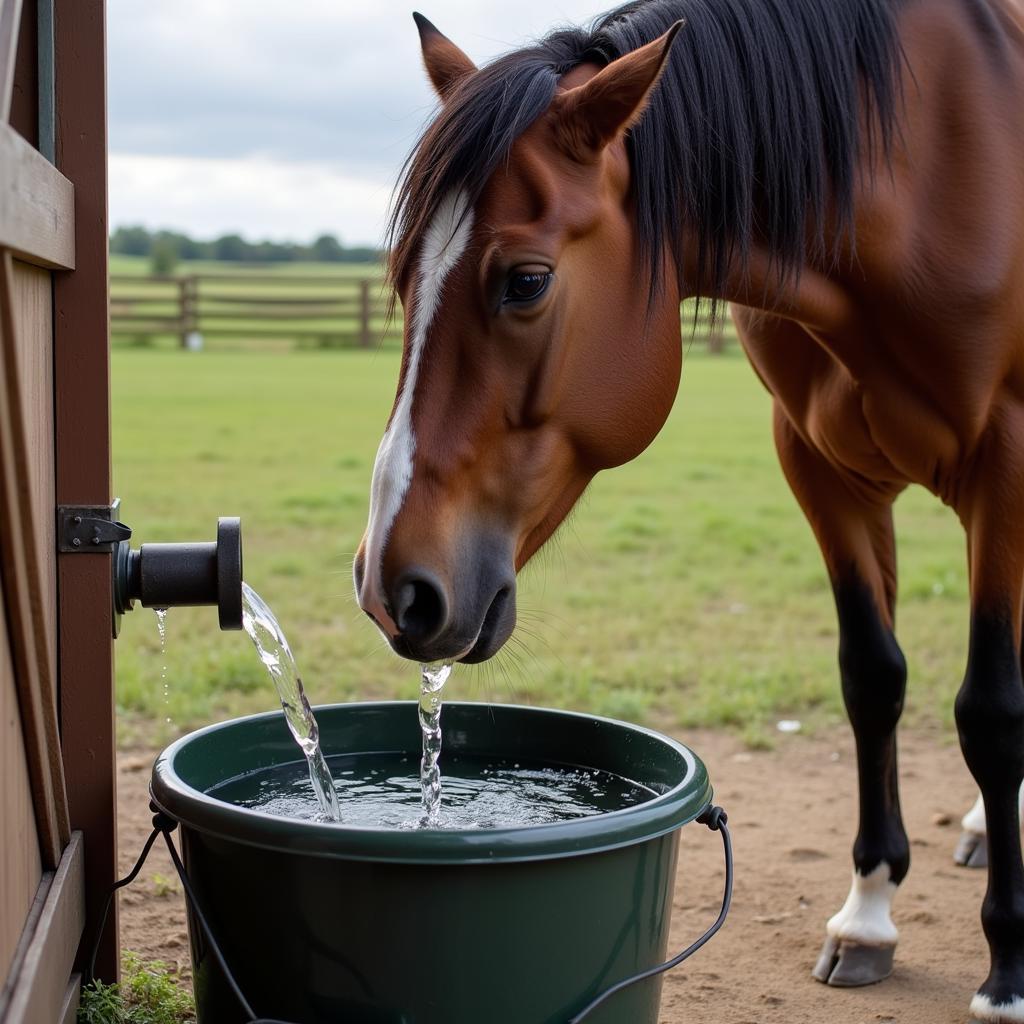Water is essential for a horse’s health and well-being. A horse needs to consume a significant amount of water daily to stay hydrated, especially during periods of hot weather or strenuous activity. Providing your equine companion with access to clean, fresh water in a suitable container is crucial. That’s where Horse Water Buckets come in. But with so many options available, selecting the right ones can be daunting. This comprehensive guide explores the world of horse water buckets, providing valuable insights to help you make informed decisions for your beloved animal.
Factors to Consider When Choosing Horse Water Buckets
Choosing the right water buckets for your horse involves considering various factors, including:
Material
Horse water buckets are available in a range of materials, each with its pros and cons:
- Rubber: Durable, heavy-duty, and long-lasting, rubber buckets resist cracking and chipping. However, they can be heavier and more expensive than other options.
- Plastic: Lightweight and affordable, plastic buckets are easy to clean and come in various sizes and colors. However, they may crack in freezing temperatures or if chewed by your horse. Look for food-grade plastic for added safety.
- Metal: Galvanized steel buckets are incredibly durable and resistant to chewing, making them a good choice for horses prone to biting their buckets. However, they can rust over time and may dent if dropped.
Size and Capacity
The size of the water bucket should correspond to your horse’s size and water consumption needs. A general guideline is to provide a bucket that holds at least 5 gallons of water.
Ease of Cleaning
Regular cleaning is essential to prevent the growth of algae and bacteria. Look for buckets with smooth, rounded edges and a wide mouth for easy scrubbing and rinsing.
Durability
Horse water buckets should be able to withstand the rigors of daily use, including being stepped on, knocked over, and exposed to the elements.
Safety
Choose buckets that are non-toxic and free of sharp edges that could injure your horse.
Types of Horse Water Buckets
 Heated and Insulated Water Buckets for Horses
Heated and Insulated Water Buckets for Horses
Beyond the basic types mentioned above, you’ll find specialized water buckets designed for specific needs:
Heated Buckets
Ideal for colder climates, heated buckets prevent water from freezing during winter, ensuring your horse has access to liquid water even in sub-zero temperatures. Look for buckets with adjustable thermostats and durable heating elements. You can learn more about providing water during the winter months in our article about insulated water troughs for horses.
Insulated Buckets
While not actively heated, insulated buckets help retain water temperature for extended periods, making them suitable for colder climates or during transitional seasons.
Automatic Waterers
These convenient systems connect to a water source, automatically refilling the bucket as the horse drinks. Automatic waterers eliminate the need for manual refills, ensuring a constant water supply. You can find more information about automatic waterers in our comprehensive guide to water containers for horses.
Corner Buckets
Designed to fit snugly in the corner of a stall or paddock, corner buckets maximize space utilization and minimize spills.
Tips for Using Horse Water Buckets
 Horse Drinking Water from a Bucket
Horse Drinking Water from a Bucket
- Placement: Place water buckets in easily accessible locations within your horse’s stall, paddock, or pasture. Ensure the buckets are on a level surface to prevent tipping.
- Fresh Water: Refresh the water in your horse’s buckets at least once daily, more often in hot weather or if the water becomes dirty.
- Cleaning: Clean your horse’s water buckets regularly with a brush and mild detergent. Rinse thoroughly to remove any soap residue.
- Monitoring Water Intake: Keep an eye on your horse’s water consumption. Changes in drinking habits can indicate an underlying health issue. If you notice any unusual changes, consult your veterinarian.
“Keeping a close eye on your horse’s water intake can be as crucial as monitoring their feed intake,” says Dr. Emily Carter, a veterinarian specializing in equine care. “Changes in drinking habits can be early indicators of potential health problems, so it’s essential to address any concerns with your veterinarian promptly.”
Conclusion
Choosing the right horse water buckets is crucial for your equine companion’s health and happiness. Consider your horse’s individual needs, budget, and management style when making your selection. By prioritizing access to clean, fresh water, you contribute to your horse’s overall well-being and ensure they stay hydrated and healthy for years to come.
FAQs About Horse Water Buckets
- How many water buckets does a horse need? Ideally, a horse should have access to at least two water sources, especially in larger pastures. This ensures they always have a backup option if one bucket becomes empty or dirty.
- Can I use a regular bucket for my horse’s water? While you can technically use any food-grade bucket, it’s best to opt for buckets specifically designed for horses. They are generally more durable and safer for equine use.
- How often should I clean my horse’s water buckets? Aim to clean your horse’s water buckets at least once a week. However, if you live in a warmer climate or notice the water getting dirty quickly, daily cleaning may be necessary.
- What should I do if my horse isn’t drinking enough water? If you suspect your horse isn’t drinking enough water, contact your veterinarian immediately. They can help determine the cause and recommend appropriate solutions.
- Can I add electrolytes to my horse’s water? While electrolytes can be beneficial for horses, especially during hot weather or after strenuous activity, it’s best to consult with your veterinarian before adding anything to their water. They can advise you on the appropriate type and dosage of electrolytes for your horse’s individual needs.
Do you have other questions about your horse’s health or how to best care for them? You might find answers in our articles about horse slow feeders or information about common ailments, like can a horse get a cold.
For further assistance or personalized advice on caring for your equine companion, don’t hesitate to contact us. Justus Horses USA is committed to providing horse owners with the knowledge and support they need to keep their beloved animals healthy and happy.
Reach out to our dedicated customer care team:
Phone: 0772127271
Email: [email protected]
Address: QGM2+WX2, Vị Trung, Vị Thuỷ, Hậu Giang, Việt Nam
Our team is available 24/7 to answer your questions and provide expert guidance.